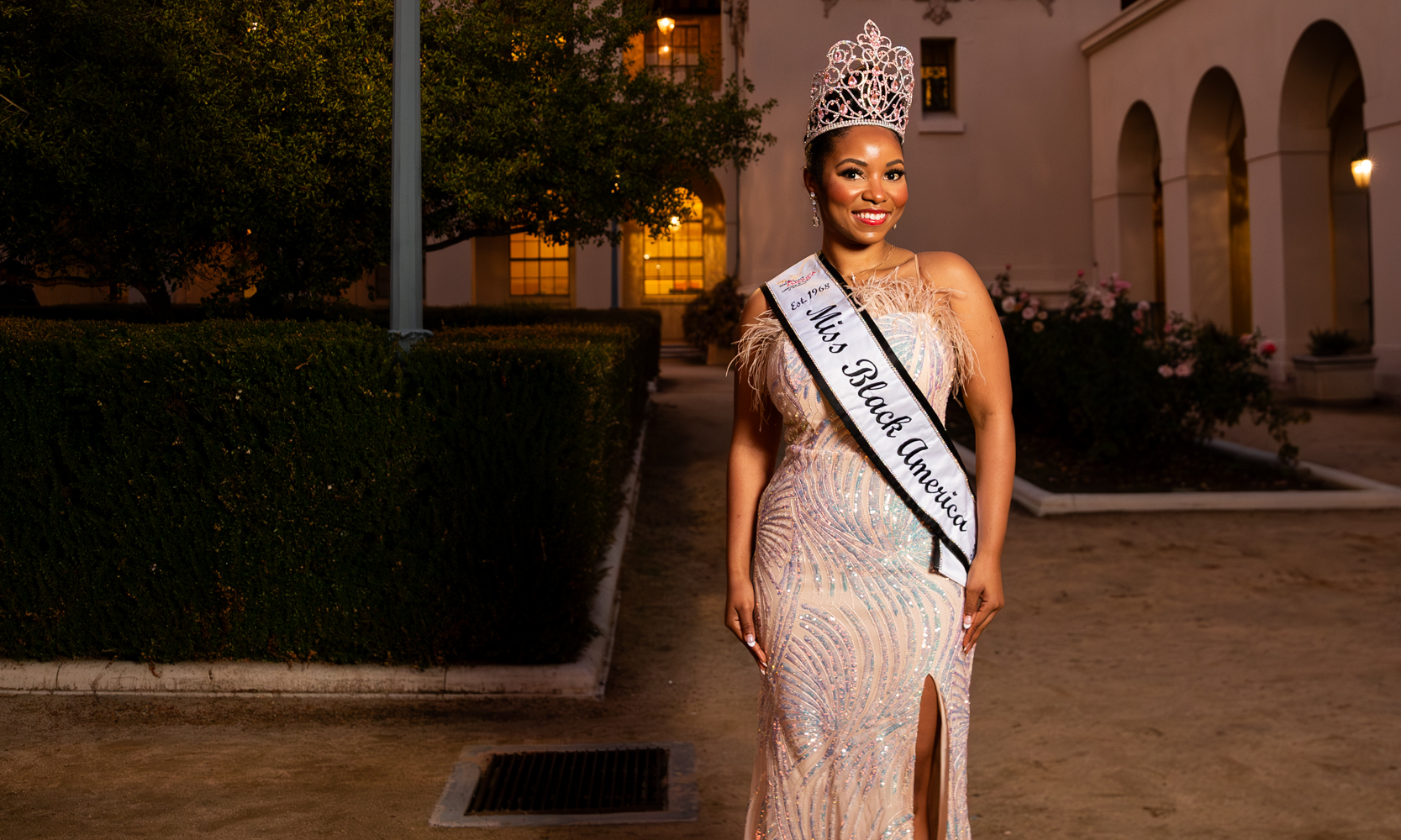
When a student is building a legacy, they often know where they’re headed.
For Gabrielle K. Wilson ’19, that destination was Bimini, Bahamas, where in December 2023 she was crowned Miss Black America. Wilson, who earned her Loyola Marymount University degree in political science with a minor in business economics, is quick to credit the support she’s received from her mother and LMU campus resources such as The Learning Community (TLC) and the African American Alumni Association, as she delivers that message during her official appearances.
“When I get the opportunity to travel and wear the Miss Black America regalia, I am bowled over with the warm reception from people all over the world,” she said. “The Miss Black America pageant provides an invaluable opportunity to showcase the regality of intellectual black thought, leadership, and beauty.”
She recognized early the value of representation, positive public image, and the responsibility of the Miss Black America title. She enthusiastically conveys a message of action.
“In all areas of activity, I am committed to cultivating environments and avenues for opportunity to the community I serve. Through the Miss Black America platform, I endeavor to amplify, educate, and advocate, leveraging the inherent influence it holds. The history and legacy of the Miss Black America pageant emboldens me with a confidence that has been paramount. As a Black woman, who navigates spaces that are often excluding and have many barriers to entry, I aspire for those who follow to be amplified, supported, and successful.”
Wilson’s interests have always leaned toward community, scholarship, and service core values that distinguish LMU. She says the well-rounded education she received has fueled her success as a reporting and analytics specialist in the mergers and acquisitions department for Salesforce. She has also put those interests to work on Karen Bass’ mayoral campaign and Kamala Harris’ Senate campaign, and in Mayor Eric Garcetti’s office, demonstrating her dedication to serving the broader Los Angeles community, a passion that informed her priorities as Miss Black America.
Competing in the pageant has always been an ambition for Wilson, whose mother, Lana Young (contestant number 18) was previously Miss Black America California. The Miss Black America was created in 1968 as a national protest pageant as a response to the Miss America Pageant “Rule 7 bylaw” forbidding Black women from competing. The Miss Black America Pageant expressly gave Black women a place to be recognized and celebrated. The first Black contestant competed in the Miss America pageant in 1970.
While the Miss America pageant system has since abolished that rule, the continued existence of the Miss Black America pageant remains as crucial today as it was during its inception, Wilson said. “The Miss Black America pageant drives a systematic, concerted effort, that showcases Black excellence, ‘Black Girl Magic,’ and the Black experience to the forefront,” she said. “Through its endeavors, the pageant actively combats negative portrayals of Black individuals, dialogue, and narratives in the media and various spheres of activity. I want to be known for building constructive pathways toward greater i opportunities, access, , empowerment, and positive representation.”
Wilson works hard against the stereotype associated with pageants. “Educating people of the auspicious of the Miss Black America legacy has had its challenges,” she said. “Some individuals perceive pageants merely as vapid and exploitive platforms. “Not everyone is going to “get it” and that’s OK. It just strengthens my resolve.” While she concedes that it easier said than done, she faces the preconceived notions of what a beauty queen is head-on, and quickly points out the accomplishments of pageant winners such as herself. “The contemporary zeitgeist surrounding beauty queens, particularly those of the Miss Black America legacy, is vast and multifaceted, marked by numerous achievements, Wilson said. “Notable Miss Black America alumnae include media icon Oprah Winfrey, C-level executives like Paula Gwynn Grant, professional wrestlers such as Sharmell Sullivan, academic leaders like Brittany Lewis, and many other accomplished queens.”
As her reign comes to an end, she looks back on a year of exciting travel, with her mother often by her side, to Atlantic City, Washington, D.C., Detroit, Houston, Dallas, Miami, and other cities. She has relished becoming a spokesperson for society and representing Black women on a broader stage, and “the family feeling of incredible women.” A high point in her year was meeting with the Congressional Black Caucus to lobby for representation of Black women in media, continuing her public-minded service.



